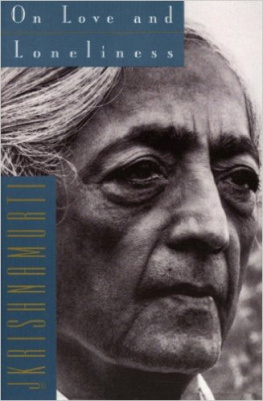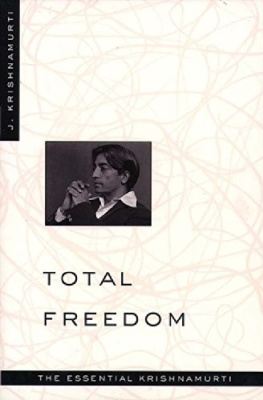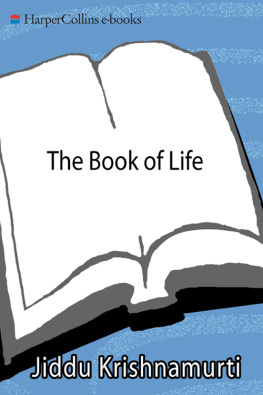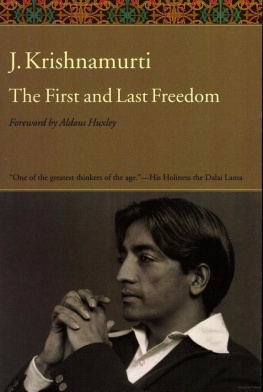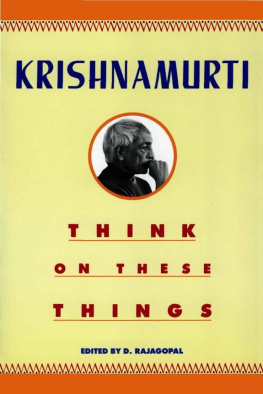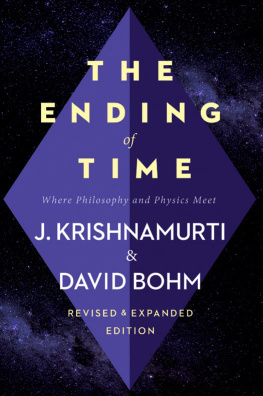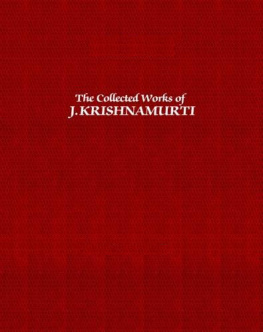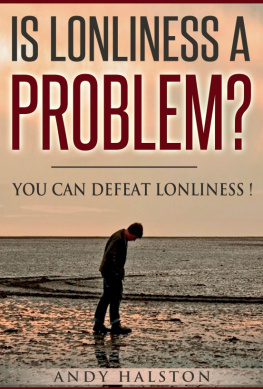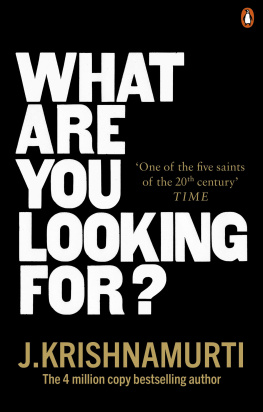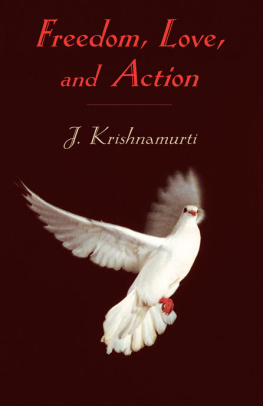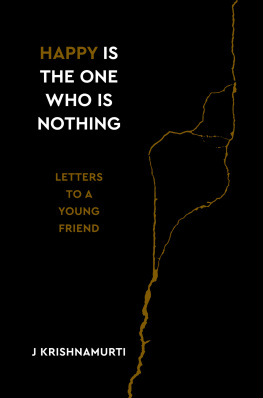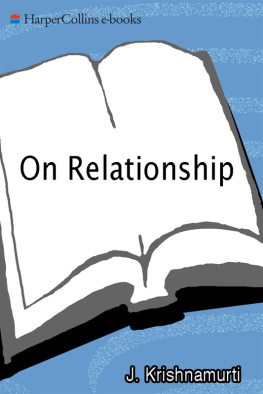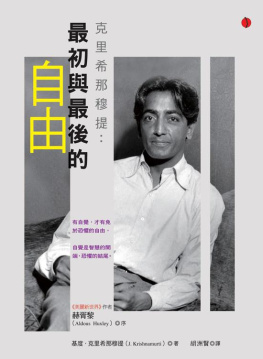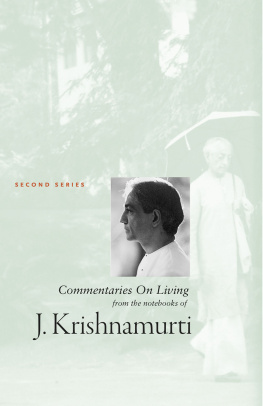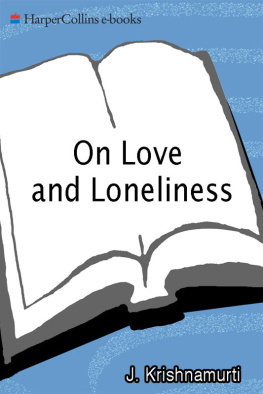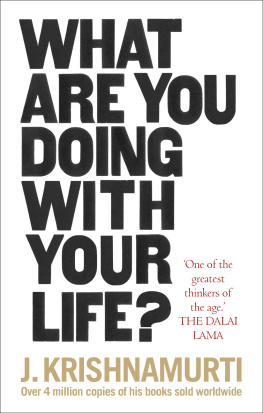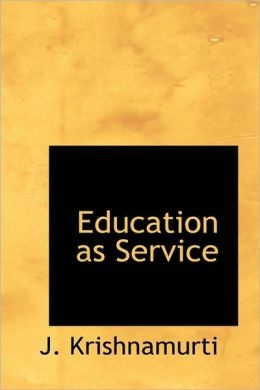J IDDU K RISHNAMURTI WAS born in India in 1895 and, at the age of thirteen, was taken up by the Theosophical Society, which considered him to be the vehicle for the world teacher whose advent it had been proclaiming. Krishnamurti was soon to emerge as a powerful, uncompromising, and unclassifiable teacher, whose talks and writings were not linked to any specific religion and were of neither the East nor the West but for the whole world. Firmly repudiating the messianic image, in 1929 he dramatically dissolved the large and monied organization that had been built around him and declared truth to be a pathless land, which could not be approached by any formalized religion, philosophy, or sect.
For the rest of his life Krishnamurti insistently rejected the guru status that others tried to foist upon him. He continued to attract large audiences throughout the world but claimed no authority, wanted no disciples, and spoke always as one individual to another. At the core of his teaching was the realization that fundamental changes in society can be brought about only by a transformation of individual consciousness. The need for self-knowledge and understanding of the restrictive, separative influences of religious and nationalistic conditionings was constantly stressed. Krishnamurti pointed always to the urgent need for openness, for that vast space in the brain in which there is unimaginable energy. This seems to have been the wellspring of his own creativity and the key to his catalytic impact on such a wide variety of people.
Krishnamurti continued to speak all over the world until he died in 1986 at the age of ninety. His talks and dialogues, journals and letters, have been preserved in over sixty books and hundreds of recordings. From that vast body of teachings this series of theme books has been compiled. Each book focuses on an issue that has particular relevance to and urgency in our daily lives.
I N TALKING OVER together these questions, which are our daily problems of life, I think we have to bear in mind that we are investigating together; together we are taking a journey into rather complex issues of life, and to investigate together there must be a quality of intensity, a quality of mind that is not tethered to any particular belief or conclusion, but is willing to go very far, not in distance of time, but in depth.
W E ARE GOING to inquire together about whether we can bring about order in our daily life of relationship. Because relationship is society. The relationship between you and me, between me and another, is the structure of society. That is, relationship is the structure and the nature of society. I am putting it very, very simply. And when there is no order in that relationship, as there is at present no order, then every kind of action must be not only contradictory, but must also produce a great deal of sorrow, mischief, confusion, and conflict. Please, dont just let me talk, but share it together, because we are taking a journey together, perhaps hand in hand, with affection, with consideration. If you merely sit down and are talked at, or lectured to, then I am afraid you and I cannot take the journey together hand in hand. So please do observe your own mind, your own relationshipit doesnt matter with whom it is, your wife, your children, with your neighbour, or with your governmentand see if there is order in that relationship; because order is necessary, precision is necessary. Order is virtue, order is so mathematical, so pure, complete, and we are going to find out if there is such order.
No one can live without relationship. You may withdraw into the mountains, become a monk, a sannyasi, wander off into the desert by yourself, but you are related. You cannot escape from that absolute fact. You cannot exist in isolation. Your mind may think it exists in isolation, or bring about a state of isolation, but even in that isolation you are related. Life is relationship, living is relationship. We cannot live if you and I have built a wall around ourselves and just peep over that wall occasionally. Unconsciously, deeply, under the wall, we are related. I do not think we have paid a great deal of attention to this question of relationship. Your books dont talk about relationship; they talk about God, practice, methods, how to breathe, about not doing this or that, but I have been told that relationship is never mentioned.
Relationship implies responsibility, as freedom does. To be related is to live; that is life; that is existence. And if there is disorder in that relationship, our whole society, culture goes to pieces, which is what is happening now.
So what is order, what is freedom, and what is relationship? What is disorder? Because when the mind really deeply, inwardly understands what brings about disorder, then out of that insight, out of that awareness, out of that observation, order naturally comes. It is not a blueprint of what order should be; that is what we have been brought up witha pattern that has been laid down by religions, by cultures, as to what order should be, or what order is. The mind has tried to conform to that order, whether it is cultural order, social order, legalistic order, or religious order; it has tried to conform to the pattern established by social activity, by certain leaders, teachers. To me that is not order because in that is implied conformity, and where there is conformity, there is disorder. Where there is the acceptance of authority, there is disorder. Where there is comparative existencethat is, measuring yourself against somebody, comparing yourself with somebodythere is disorder. I will show you why.
Why does your mind conform? Have you ever asked? Are you aware that you are conforming to a pattern? It doesnt matter what that pattern is, whether you have established a pattern for yourself or it has been established for you. Why are we always conforming? Where there is conformity there cannot be freedom, obviously. Yet the mind is always seeking freedomthe more intelligent, the more alert, the more aware it is, the greater the demand. The mind conforms, imitates, because there is more security in conformity, in following a pattern. Thats an obvious fact. You do all kinds of things socially because it is better to conform. You may be educated abroad, you may be a great scientist, politician, but you always have a sneaking fear that if you dont go to temples or do the ordinary things that you have been told to do, something evil might happen, so you conform. What happens to the mind that conforms? Investigate it, please. What happens to your mind when you conform? First of all, there is a total denial of freedom, total denial of perception, total denial of independent inquiry. When you conform there is fear. Right? From childhood the mind has been trained to imitate, conform to the pattern which society has establishedpass examinations, get a degree, if you are lucky get a job, and get married, finished. You accept that pattern, and you are frightened not to follow that pattern.
So inwardly you deny freedom, inwardly you are frightened, inwardly you have a sense of not being free to find out, inquire, search, ask. So that produces disorder in our relationship. You and I are trying to go into this really deeply, to have real insight, see the truth of it; and it is the perception of the truth that frees the mind, not some practice, or the activity of inquiry, but the actual perception of what is.

